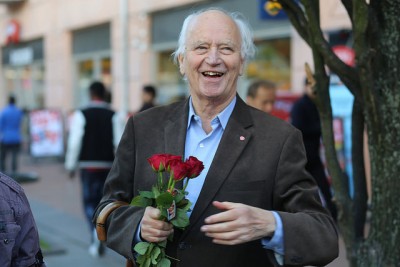Around 65,000 households in Oslo’s east-side district of Groruddalen alone can expect Labour Party promoters to knock on their doors over the next week. The party is mobilizing its troops all over the country in a desperate effort to ward off their potentially worst election result in years.

Labour’s candidate for prime minister, Jonas Gahr Støre, had to admit once again during Tuesday night’s major debate against the Conservatives’ incumbent prime minister, Erna Solberg, that the latest poll numbers are awful. Not only has his party fallen from highs of over 36 percent of the vote last year to just over 24 percent now, he personally is favoured by far fewer Norwegians than Solberg.
Commentators and election analysts are trying again to sum up the reasons for Labour’s slide, but there are many. They all boil down to an election campaign strategy, aimed at benefiting from Norway’s economic downturn during the past few years, that has backfired badly. Labour politicians seemed to think that only they could solve the downturn that was set off by the oil price collapse, but the “crisis” that Labour maximized has itself collapsed under Solberg’s and Finance Minister Siv Jensen’s leadership. Nor have Norwegian voters been able to recognize Støre’s version of reality in Norway, claim commentators on both the right and the left, because they don’t think things are as bad as Labour politicians describe.
‘Too late’ to shift strategy
Labour Party veteran Thorvald Stoltenberg, the 86-year-old father of former Prime Minister Jens Stoltenberg who now heads NATO, told newspaper VG on Tuesday that it’s “too late” to change Labour’s flawed strategy now. He also questions whether it was a good idea to launch Labour’s campaign with a promise of raising taxes by NOK 15 billion over the next four-year parliamentary session.
“This is my 28th election campaign and I’ve experienced both upturns and downturns,” Stoltenberg told VG. “I can’t deny the numbers, and now it’s a downturn for the Labour Party. All these polls can’t be wrong.” He downplayed the drama, but noted that the party doesn’t have much time left to reverse the trend.
“I hope we’ll get a better election result than the polls show,” said Stoltenberg, who has served as both defense and foreign minister in Norway as well as being a life-long diplomat and ambassador. “I hope that our policies will give us a good result, and I have to believe in what I hope for.”
Even industrial workers in various towns around Norway like Årdal, where Labour has long had a majority, have spoken out, though, against Labour’s proposed tax hikes and don’t think they’re needed. “What’s important now is to explain how the higher tax revenues will be used,” Stoltenberg said. “When I see the polls, I think the message has gotten through, but hasn’t been well-received. I have to say that.”
Since it’s “too late” to change the party’s platform and tax strategy, “the only thing we can do now is knock on doors and talks with folks,” Stoltenberg said. “If we tried to change the strategy we’d only confuse voters.”
Fanning out to win voters
So Labour’s troops are due to be out in force in the run-up to the election on September 11, targeting traditionally Labour-friendly areas. Among the campaigners will be Raymond Johansen, Labour’s former national secretary who now heads Oslo’s city government. He’s fended off criticism after imposing Oslo’s controversial property tax and is prepared to defend Labour’s controversial tax strategy as he knocks on doors and hands out brochures and red Labour roses himself.
“The polls have surely surprised many, but also led more to engage themselves,” Johansen told newspaper Aftenposten on Wednesday. “They understand what’s at stake.” He thinks many Labour supporters “took it for granted” that Labour could unseat Solberg, “but now the alarm has been sounded and everyone is aware that it will be a struggle to win.” The Labour-led city government in Bergen is also mobilizing for a last minute campaign spurt.
The close race among Norway’s nine parties vying for representation in Parliament also means that even though Labour may “lose” the election, Støre may still emerge as prime minister. Solberg still may not be able to form a majority coalition even if her Conservatives win more votes than Labour. Lots of post-election negotiations loom, and the actual results may not be clear for weeks.
See more of our election coverage here.
newsinenglish.no/Nina Berglund

